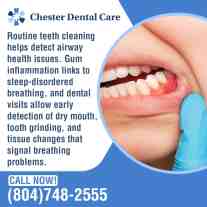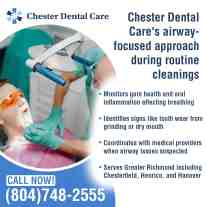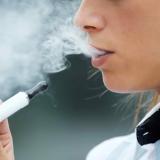Professional dental cleanings support healthy breathing by reducing bacterial inflammation that can affect airway tissues. Regular teeth cleaning removes harmful bacteria and plaque that contribute to gum disease, which research shows increases the risk of sleep apnea in severe cases. The national average cost for teeth cleaning ranges from $100 to $250, making it an affordable investment in both oral and airway health.
Airway health means your body maintains clear, unobstructed breathing during rest and activity. When your oral health suffers from bacterial buildup, it creates systemic inflammation that can worsen breathing problems and sleep disorders. Professional cleaning of teeth every six months helps prevent this cycle while allowing your dentist to notice airway-related issues early so that you can carry out further evaluations.
Maintaining both healthy airways and clean teeth creates a foundation for better sleep, reduced inflammation, and improved overall wellness. At Chester Dental Care in Chester, Virginia, patients discover how airway-focused dental care addresses the root causes of both oral and breathing problems.
Key Takeaways
-
Professional teeth cleaning reduces bacterial inflammation that can worsen airway problems, with research showing gum disease increases sleep apnea risk in severe cases.
-
Regular teeth cleaning near you costs $100-$250 but prevents expensive complications like advanced gum disease ($1,500-$3,000) and even sleep apnea treatments later.
-
Mouth breathing from airway issues creates a harmful cycle - it dries oral tissues, increases bacteria, and worsens both dental health and breathing problems simultaneously.
-
Dental cleanings provide early airway problem detection through signs like tooth grinding wear, dry mouth, and throat irritation that dentists can spot before breathing issues become severe.
Skipping teeth cleaning allows bacterial buildup that contributes to systemic inflammation, affecting both gum health and airway tissue function throughout your respiratory system.

What Is Airway Health and Why Does It Matter?
Airway health describes your body's ability to breathe clearly through unobstructed nasal passages, throat, tongue position, and oral cavity. Your respiratory system depends on proper airflow to deliver oxygen to cells and remove carbon dioxide waste products efficiently.
Your airway anatomy includes several key components that work together. Nasal passages filter and warm incoming air, while your oral cavity provides an alternate breathing route when needed. The throat, tongue, and surrounding soft tissues must maintain proper positioning to keep airways open during sleep and daily activities.
Poor airway health affects sleep quality, oxygen supply, and systemic health throughout your body. Common airway issues include sleep-disordered breathing, obstructive sleep apnea, chronic nasal congestion, and mouth breathing patterns that disrupt normal oral function.
Sleep-disordered breathing affects nearly 1 billion adults worldwide, with up to 80-85% of cases remaining undiagnosed in the United States, according to recent medical research. These conditions can lead to cardiovascular stress, cognitive impairment, and reduced quality of life when left untreated.
Why Does Oral Health Affect Airway Function?
Oral bacteria and gum inflammation directly influence airway tissues through shared blood vessels and proximity to breathing passages. When harmful bacteria accumulate in your mouth, they create inflammatory compounds that can affect throat tissues and breathing passages.
Gum disease produces systemic inflammation that travels through your bloodstream. This inflammation can cause swelling in airway tissues, making breathing more difficult during sleep and daily activities. Research published by industry experts says that individuals with severe periodontitis had a greater prevalence of sleep apnea compared to those without gum disease.
Enlarged tonsils and adenoids often develop alongside poor oral hygiene, creating additional airway restrictions. Mouth breathing, a common response to airway problems, creates a cycle that worsens oral health. When you breathe through your mouth instead of your nose, saliva flow decreases and oral tissues dry out. This environment allows harmful bacteria to multiply more rapidly, increasing cavity risk and gum disease progression.
The connection works both ways: poor oral health worsens airway function, while airway problems like mouth breathing damage oral tissues and create conditions for bacterial overgrowth.
What Do Professional Dental Cleanings Remove Besides Plaque?
Professional teeth cleaning removes bacterial biofilms, tartar, and inflammatory toxins that regular brushing cannot eliminate. Dental hygienists use specialized ultrasonic tools and hand instruments to access areas below the gumline where harmful bacteria accumulate.
During professional cleaning, your hygienist removes several types of buildup:
-
Plaque biofilms containing hundreds of bacterial species that produce acid and toxins
-
Calcified tartar that harbors bacteria and irritates gum tissues
-
Bacterial endotoxins that trigger inflammatory responses in gum tissues
-
Surface stains from coffee, tea, and other substances that can harbor bacteria
-
Food debris in hard-to-reach areas between teeth and along the gumline
Professional cleanings reduce the total bacterial load in your mouth, which decreases systemic inflammation affecting airway tissues. The average cost of teeth cleaning ranges from $75 to $250 without insurance, making it an affordable preventive treatment.
Regular cleanings also include fluoride treatments that strengthen tooth enamel and provide antimicrobial benefits. This additional protection helps prevent bacterial overgrowth between dental visits.
The thorough teeth cleaning process creates an environment where beneficial bacteria can thrive while harmful species that contribute to inflammation are reduced significantly.
How Do Airway Problems Show Up During Dental Exams?
Dental professionals can identify airway issues through specific oral signs, including dry mouth, tooth grinding wear patterns, scalloped tongue edges, and throat redness. These indicators often appear months or years before patients experience obvious breathing problems.
Mouth breathing leaves distinct oral signatures that trained dentists recognize immediately. Dry mouth conditions (xerostomia) cause increased cavity rates, gum recession, and bacterial overgrowth. Patients who breathe through their mouths during sleep often wake with sticky saliva and morning breath that persists despite brushing.
Sleep apnea creates several detectable oral symptoms:
-
Tooth wear patterns from nighttime grinding (bruxism) as the jaw attempts to reopen blocked airways
-
Scalloped tongue with indented edges from pressing against teeth during breathing interruptions
-
Red, irritated throat tissues from vibrations caused by snoring and airway turbulence
-
Large tonsils that may contribute to airway obstruction during sleep
-
High, narrow palate that reduces nasal breathing capacity
Dental cleanings provide the perfect opportunity for early airway assessment because hygienists spend extended time examining oral tissues. During cleaning appointments, dental professionals can measure pocket depths around teeth, which often correlate with systemic inflammation levels affecting breathing.
Regular dental cleanings enable dentists to monitor changes in the health of oral tissues over time. This helps identify patterns that may indicate emerging airway issues before they become serious. During these teeth cleanings and examinations, dentists may discover signs that require additional investigation. In such cases, the next step is to refer the patient to a physician for an accurate diagnosis and treatment plan.
The Two-Way Relationship: How Dental Cleanings Support Airway Health
Regular professional cleanings reduce bacterial loads that contribute to airway tissue inflammation, creating conditions for improved breathing. When harmful bacteria levels decrease, systemic inflammation markers also drop, allowing airway tissues to function more normally.
Healthy gums mean less systemic inflammation circulating through your bloodstream to affect nasal passages and throat tissues. Studies show that patients who maintain regular cleaning schedules have lower levels of C-reactive protein and other inflammatory markers associated with airway restrictions.
Professional cleanings every six months provide several airway health benefits:
-
Reduced bacterial toxin production that can cause tissue swelling in breathing passages
-
Lower systemic inflammation that allows nasal tissues to function properly
-
Improved tissue healing in both oral and airway areas due to reduced bacterial interference
-
Better saliva flow from healthier gum tissues that support natural mouth cleaning
Cleanings also give dentists regular opportunities to monitor airway-related changes. Airway-focused dental practices like Chester Dental Care use cleaning appointments to assess breathing patterns, notice sleep-related issues, and coordinate treatment with medical professionals when needed.
Patients who follow regular teeth cleaning schedules experience lower rates of severe gum disease, which research has linked to the development of sleep apnea. This preventive approach helps maintain both oral health and airway function simultaneously.
Teeth Cleaning Cost and Airway Benefits
Cleaning Type |
Average Cost |
Airway Benefits |
Routine Prophylaxis |
$100-$250 |
Reduces bacterial inflammation affecting breathing |
Deep Cleaning (per quadrant) |
$150-$350 |
Treats severe gum disease linked to sleep apnea |
Maintenance Cleaning |
$125-$200 |
Prevents bacterial overgrowth and airway irritation |
What Happens If You Skip Dental Cleanings and Airway Care?
Skipping regular cleanings allows bacterial buildup that increases gum disease risk, creating a cycle where poor oral health worsens airway restrictions.
The cycle of neglect affects both systems simultaneously. When you skip professional teeth cleaning, plaque hardens into tartar that harbors harmful bacteria. These bacteria produce toxins that cause gum inflammation, which contributes to systemic inflammation affecting airway tissues.
Untreated airway issues create their own oral health problems:
-
Chronic mouth breathing dries oral tissues and reduces natural bacterial control
-
Sleep apnea leads to teeth grinding that damages enamel and strains jaw muscles
-
Frequent throat clearing irritates oral tissues and disrupts normal saliva flow
-
Snoring vibrations can cause tissue inflammation extending to gum areas
Long-term consequences include severe gum disease, tooth loss, and worsened sleep apnea requiring complex medical interventions. The average cost of treating advanced gum disease ranges from $1,500 to $3,000, compared to $200-$500 annually for preventive cleanings.
Cardiovascular stress from both untreated gum disease and sleep apnea compounds health risks. Early intervention through regular cleanings and airway assessment prevents this downward spiral while maintaining both oral and overall health affordably.
Practical Steps to Protect Both Your Smile and Breathing
Schedule professional teeth cleaning at least twice yearly to maintain low bacterial levels that support both oral and airway health. Most dental insurance plans cover preventive cleanings, making this care accessible for maintaining overall wellness.
Report breathing-related symptoms to your dental team during cleaning appointments. Signs to mention include snoring, morning dry mouth, teeth grinding, frequent throat clearing, or daytime fatigue that might indicate sleep-disordered breathing.
Daily oral hygiene practices support both systems effectively:
-
Brush teeth twice daily with fluoride toothpaste to control bacterial growth
-
Floss daily to remove bacteria from areas that contribute to gum inflammation
-
Use antimicrobial mouthwash to reduce bacterial loads between professional cleanings
-
Stay hydrated to maintain saliva flow that naturally cleanses oral tissues
Work collaboratively with both dental and medical professionals for airway-related concerns. Airway-focused dental practices can coordinate care with physicians, sleep specialists, and other healthcare providers to address root causes of both oral and breathing problems.
Consider pediatric cleanings and airway assessment starting early, as airway development issues often begin in childhood. Early intervention can prevent more complex problems that develop when both oral health and breathing patterns remain untreated.
Chester Dental Care provides routine dental care and airway-focused cleaning services that address both oral health and breathing concerns simultaneously, helping patients achieve better sleep and improved overall wellness.

Conclusion
The connection between airway health and dental cleanings represents a powerful opportunity to improve both your breathing and your smile through regular preventive care. Professional teeth cleaning removes harmful bacteria that contribute to systemic inflammation, supporting healthier airway function while preventing oral disease.
Rather than viewing dental cleanings as purely cosmetic procedures, understand them as part of whole-body health maintenance that affects sleep quality, breathing patterns, and cardiovascular wellness. Regular cleanings provide affordable prevention that costs far less than treating advanced gum disease or sleep apnea complications.
The relationship works both ways: maintaining healthy airways supports oral health, while professional cleanings create conditions for better breathing. This integrated approach offers the best outcomes for patients seeking long-term wellness.
Take Control of Your Airway and Oral Health Today
Ready to discover how professional dental care can improve both your smile and your sleep? Chester Dental Care specializes in airway-focused dental treatments that address the root causes of both oral health and breathing problems.
Our experienced team, led by Dr. Shwetha Rodrigues with almost two decades of dental experience and nearly a decade specializing in airway and sleep dentistry, provides comprehensive general dentistry care that goes beyond traditional cleaning. As Vivos Clinical Advocates, we understand how airway health affects your overall quality of life and well-being.
Call Chester Dental Care today at (804) 748-2555 or email frontdesk@chesterdentalcareva.com to schedule your airway-focused cleaning and exam. We proudly serve Chester and nearby areas throughout the Greater Richmond region.
Don't wait for breathing problems or oral pain to affect your quality of life. Professional teeth cleaning and airway assessment can help you smile brighter, sleep more comfortably, and live lighter starting today.



